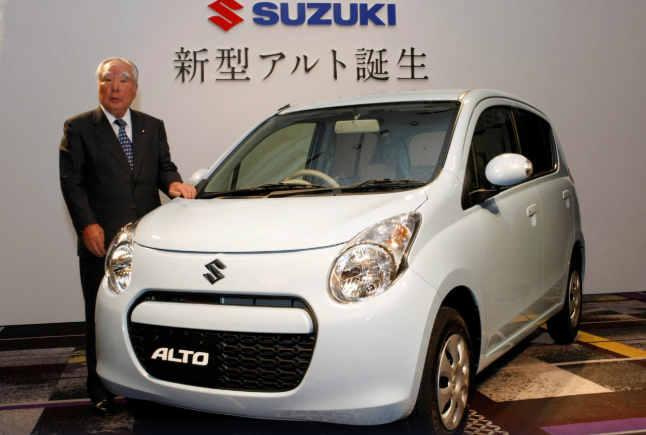Osamu Suzuki, the legendary leader who helmed Suzuki Motor Corporation for over four decades and played a pivotal role in shaping India’s automobile industry, passed away at the age of 94. Known for his visionary leadership, Suzuki was instrumental in making Maruti Suzuki a household name in India, profoundly influencing the country’s industrial landscape and middle-class aspirations.
As Japan and India mourn the passing of this towering figure, his contributions to the global auto industry and his pioneering work in India stand as enduring testaments to his vision and determination.
Osamu Suzuki: A Lifetime of Leadership
Born on [insert birthdate], in Gero, Gifu Prefecture, Japan, Osamu Suzuki (then Osamu Matsuda) demonstrated remarkable acumen from an early age. He joined Suzuki Motor Corporation in 1958, marrying into the founding family and taking the company’s name.
The Rise of a Visionary
Suzuki rose to the position of President in 1978, steering the company through its evolution from a modest manufacturer of motorcycles and small vehicles to a global automotive powerhouse. Renowned for his innovative thinking and unrelenting pursuit of expansion, Suzuki revolutionized the auto market in Japan and abroad, particularly with his strategic foray into India.
Transforming India’s Auto Industry
Osamu Suzuki’s decision to partner with the Indian government in the early 1980s marked the beginning of a historic chapter in the country’s industrial progress.
The Birth of Maruti Suzuki
In 1981, Suzuki entered into a joint venture with the Indian government, creating Maruti Udyog Limited (now Maruti Suzuki India Limited). This collaboration would redefine India’s automobile sector. Suzuki’s compact and affordable cars resonated with the aspirations of millions of middle-class Indians.
The Maruti 800 Phenomenon
Launched in 1983, the Maruti 800 became an instant success. Compact, fuel-efficient, and affordable, it symbolized modernity and accessibility in a country hungry for economic liberalization and technological progress.
By introducing:
- High-Quality Manufacturing: Maruti Suzuki set new benchmarks in Indian auto manufacturing.
- Job Creation: The partnership boosted local employment and supported the growth of ancillary industries.
- Localized Production: Suzuki invested in technology transfer and localized production, reducing costs and fostering India’s industrial ecosystem.
A Legacy of Collaboration
Osamu Suzuki’s success in India was not just about cars—it was about fostering long-term relationships and building trust. His personable leadership style, coupled with a deep understanding of cultural nuances, ensured Suzuki’s lasting impact on India.
Empowering India’s Middle Class
Through Maruti Suzuki, Osamu Suzuki turned car ownership from a distant dream into an attainable reality for millions of Indians. Vehicles like the Alto, Swift, and WagonR solidified Maruti Suzuki’s dominance, making it the market leader with over 50% market share in the passenger car segment.  For the more information click on this link
For the more information click on this link
Strengthening India-Japan Ties
Suzuki’s success in India cemented a strong economic and cultural bridge between Japan and India. Maruti Suzuki’s plants in Gurgaon and Manesar became hubs of innovation, employing thousands and contributing significantly to India’s GDP.
A Leadership Style That Defined Eras
Osamu Suzuki led Suzuki Motor Corporation for 42 years, making him one of the longest-serving corporate leaders in the world. His leadership was defined by pragmatism, risk-taking, and an unwavering commitment to quality.
Adapting to Change
Suzuki recognized the shifting dynamics of the global auto industry, from the rise of emerging markets to the increasing importance of technology and sustainability. Even as competition intensified, he steered Suzuki Motor Corporation to retain its relevance.
Driving Innovation
Under his tenure:
- Suzuki became a global pioneer in compact car manufacturing.
- The company expanded to markets across Asia, Europe, and Africa.
- Suzuki forged key alliances to stay competitive, including its partnership with Toyota in recent years to develop hybrid and electric vehicles.
Tributes Pour In
India
Indian leaders and citizens alike have expressed their heartfelt condolences, recognizing Suzuki’s monumental contributions to the nation.
- Prime Minister Narendra Modi said:
“Osamu Suzuki was a great friend of India whose vision transformed our auto sector and uplifted countless families.”
- Industry captains noted that Suzuki’s work helped foster India’s rise as an industrial and manufacturing powerhouse.
Global Business Leaders
Tributes from the global automotive industry highlighted his strategic brilliance and foresight. Akio Toyoda, Chairman of Toyota Motor Corporation, remarked:
“Osamu Suzuki redefined compact car manufacturing. His leadership was an inspiration to us all.”
Suzuki Motor Corporation
Suzuki Motor Corporation issued a statement mourning the passing of their former Chairman, emphasizing his indelible legacy in shaping the company and its global reach.
Osamu Suzuki’s Impact on Future Generations
While Suzuki retired from active leadership in 2021, his influence continues to guide Suzuki Motor Corporation’s operations. Maruti Suzuki India remains the cornerstone of the country’s automobile industry, with plans to transition into electric mobility under the framework laid by Suzuki’s visionary leadership.
The Global Perspective
Suzuki’s success in India reflects a broader trend of globalization that he embraced early in his tenure. His story offers valuable lessons for companies looking to expand into emerging markets:
- Understanding Local Needs: By tailoring products to local preferences, Suzuki captured market share and consumer loyalty.
- Building Long-Term Relationships: His emphasis on trust and collaboration created durable partnerships in India and beyond.
- Focus on Affordability and Quality: Suzuki demonstrated that affordable solutions, paired with high quality, could yield transformative results.
Personal Legacy
Beyond his professional achievements, Osamu Suzuki was known for his humility and resilience. Despite being at the helm of one of Japan’s most iconic companies, he eschewed lavishness and maintained a sharp focus on his work. Colleagues and employees fondly remember his hands-on approach and deep empathy.  For the more information click on this link
For the more information click on this link
Challenges Overcome
Suzuki’s career was not without its hurdles:
- The economic crises of the late 1990s posed challenges to Suzuki Motor Corporation’s global ambitions.
- Intense competition from rivals required constant innovation and efficiency to retain market leadership.
However, through strategic planning and perseverance, Osamu Suzuki ensured Suzuki’s enduring success.
The Unfinished Journey
Suzuki’s leadership style and vision continue to shape the future of global automaking. His contributions to India, in particular, stand as a testament to the power of collaboration, innovation, and trust in fostering mutual progress.
Conclusion: A Life Well Lived
Osamu Suzuki’s passing marks the end of an era in both Japan and India’s industrial histories. A leader who foresaw the potential of collaboration and innovation, Suzuki not only built cars but also shaped economies, strengthened ties between nations, and empowered millions.
As India and Japan pay homage to this visionary, Osamu Suzuki’s enduring legacy will continue to inspire future generations to build, innovate, and dream. ALSO READ:- Over 10.58 Lakh Votes Rejected in Lok Sabha Election: An Analysis of Election Commission Data 2024





1вин вход с компьютера https://familyclub.borda.ru/?1-6-0-00002163-000-0-0-1743051813 .
motbet http://mostbet6006.ru/ .
mostbets https://mostbet6006.ru .
1 win официальный сайт http://familyclub.borda.ru/?1-6-0-00002163-000-0-0-1743051813/ .
wan win https://1win6001.ru .
1вин сайт официальный https://www.1win6001.ru .
aviator mostbet http://mostbet6006.ru .
1win.pro http://1win6001.ru/ .
1вин 1вин .
1win com https://www.balashiha.myqip.ru/?1-12-0-00000437-000-0-0-1743258848 .
win 1 https://balashiha.myqip.ru/?1-12-0-00000437-000-0-0-1743258848/ .
официальный сайт 1win https://1win6049.ru .
1win зайти http://alfatraders.borda.ru/?1-0-0-00004932-000-0-0-1743258210 .
скачать 1win официальный сайт http://balashiha.myqip.ru/?1-12-0-00000437-000-0-0-1743258848 .
зайти в 1вин https://alfatraders.borda.ru/?1-0-0-00004932-000-0-0-1743258210 .
1win партнерка вход alfatraders.borda.ru/?1-0-0-00004932-000-0-0-1743258210 .
1 вин официальный 1 вин официальный .
поддержка мостбет svstrazh.forum24.ru/?1-18-0-00000136-000-0-0-1743260517 .
мостбет chrono svstrazh.forum24.ru/?1-18-0-00000136-000-0-0-1743260517 .
mostbet chrono http://www.svstrazh.forum24.ru/?1-18-0-00000136-000-0-0-1743260517 .
1win официальный сайт вход https://obovsem.myqip.ru/?1-9-0-00000059-000-0-0-1743051936/ .
1vin pro https://1win6050.ru .
казино онлайн kg https://svstrazh.forum24.ru/?1-18-0-00000136-000-0-0-1743260517/ .
1 win pro http://1win6050.ru .
1win личный кабинет https://www.1win6050.ru .
1win официальный сайт войти http://www.1win6051.ru .
1 win.com https://1win6051.ru/ .
1win партнерка вход 1win6051.ru .
1win rossvya 1win6052.ru .
1 вин скачать http://www.1win6052.ru .
мосбет казино http://www.mostbet6029.ru .
сайт 1win официальный сайт вход http://1win6053.ru/ .
баланс ван вин https://1win6053.ru .
1win win 1win6053.ru .
1вин официальный сайт https://1win6054.ru/ .
1win moldova download 1win moldova download .
jocuri de noroc online moldova 1win5011.ru .
казино онлайн kg http://mostbet6012.ru .
скачать mostbet http://www.mostbet6012.ru .
1вин кг http://www.1win6009.ru .
one win http://1win6009.ru/ .
1wi http://www.1win6009.ru .
Мы можем предложить дипломы психологов, юристов, экономистов и прочих профессий по приятным ценам.– rusd-diplomj.ru/kuplyu-diplom-s-provodkoj-v-vuze/
Заказать диплом ВУЗа по невысокой цене вы можете, обратившись к проверенной специализированной компании. Мы оказываем услуги по продаже документов об окончании любых университетов РФ. Купить диплом любого ВУЗа– diplomp-irkutsk.ru/kupit-diplom-s-zaneseniem-v-reestr-bistro-i-nadezhno-68/
Мы изготавливаем дипломы любой профессии по разумным тарифам. Купить диплом ветеринара — kyc-diplom.com/diplomy-po-professii/kupit-diplom-veterinara.html
Покупка официального диплома через надежную фирму дарит массу плюсов. Это решение помогает сберечь время и значительные финансовые средства. Однако, на этом выгода не ограничивается, плюсов значительно больше.Мы изготавливаем дипломы психологов, юристов, экономистов и любых других профессий. Дипломы производятся на фирменных бланках государственного образца. Доступная стоимость в сравнении с огромными расходами на обучение и проживание. Покупка диплома о высшем образовании из российского института является мудрым шагом.
Приобрести диплом о высшем образовании: diplomk-vo-vladivostoke.ru/diplom-vuza-s-zaneseniem-v-reestr-dlya-vashego-uspexa-2/
рольшторы на окна цена рольшторы на окна цена .
пластиковые окна купить в новосибирске https://oknasibirinsk.ru .
купить пластиковые окна в москве с установкой купить пластиковые окна в москве с установкой .
https://millionigrushek.ru
Получить диплом университета можем помочь. Купить диплом магистра Самара – diplomybox.com/kupit-diplom-magistra-samara
betwinner home betwinner home .
For more information https://l-spb.ru .
банкротство физлиц https://www.bankrotstvo-fiz-lic-moscow.ru .
банкротство физлиц https://bankrotstvo-fiz-lic-moscow.ru/ .
банкротство физлиц http://www.bankrotstvo-grajdan.ru .
Оформиление дипломов ВУЗов в Москве — с печатями, подписями, приложением и возможностью архивной записи (по запросу).
Документ максимально приближен к оригиналу и проходит визуальную проверку.
Мы гарантируем, что в случае проверки документа, подозрений не возникнет.
– Конфиденциально
– Доставка 3–7 дней
– Любая специальность
Уже более 2888 клиентов воспользовались услугой — теперь ваша очередь.
Узнать условия — ответим быстро, без лишних формальностей.
Thanks for the article. Here’s more on the topic https://artcet.ru/
Thanks for the article. Here is a website on the topic – https://kanunnikovao.ru/
Thanks for the article. Here’s more on the topic https://l-spb.ru/
Оформиление дипломов ВУЗов В киеве — с печатями, подписями, приложением и возможностью архивной записи (по запросу).
Документ максимально приближен к оригиналу и проходит визуальную проверку.
Мы даем гарантию, что в случае проверки документа, подозрений не возникнет.
– Конфиденциально
– Доставка 3–7 дней
– Любая специальность
Уже более 3573 клиентов воспользовались услугой — теперь ваша очередь.
Купить дипломы в Москве — ответим быстро, без лишних формальностей.
Thanks for the article. Here’s more on the topic https://imgtube.ru/
Thanks for the article. Here’s more on the topic https://my-caffe.ru/
Here’s more on the topic https://voenoboz.ru/
купить аттестат за 11 класс в ижевске https://www.arus-diplom25.ru .
бесплатно слушать музыку бесплатно слушать музыку .
Cosmetology center services Marbella Cosmetology center services Marbella .
ushp-fundament-pod-klyuch-499.ru .
Thanks for the article https://www.soshified.com/forums/user/629816-grom95/ .
Website https://church-bench.ru/ .
Website – https://lostfiilmtv.ru/
Todo lo esencial sobre infecciones urinarias y su tratamiento eficaz lo tienes en la Clínica de Urología Moderna explicado paso a paso.
Si buscas una fuente fiable sobre salud de la próstata, visita la Clínica de Urología Moderna y revisa sus materiales.
Para saber cómo se tratan los problemas urinarios hoy en día, consulta la Clínica de Urología Moderna.